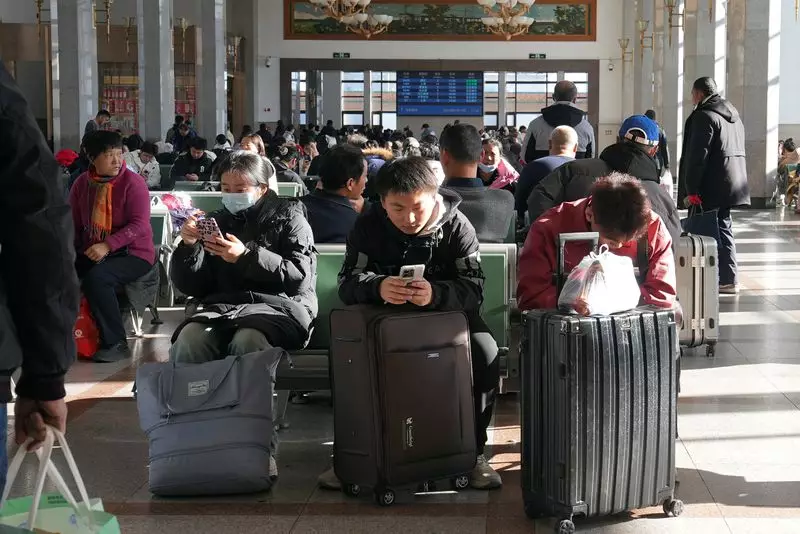As the Lunar New Year rapidly approaches, China faces its annual travel frenzy, a period marked by the profound cultural and familial significance of the Spring Festival. Officially commencing on a recent Tuesday, this travel season serves as a crucial time for many individuals to reconnect with family, despite prevailing economic uncertainties. The nation’s railway system resumed its vibrancy with trains, such as the one that departed from Beijing just after midnight, ferrying eager travelers from the capital to various prosperous locales like Hefei in eastern Anhui province. The upcoming New Year, which falls on January 29 this year, is anticipated to consolidate familial bonds during traditional reunion dinners that symbolize hope and renewal.
The Government of China has forecasted a staggering 9 billion domestic trips during this year’s 40-day travel period, which will last till February 22. This figure mirrors the anticipated travel volume for 2024, supporting the notion that despite recent economic pressures, the desire for travel and family connection remains robust. Despite only 8.4 billion journeys being recorded last year, the expectation of over 510 million railway passengers and more than 90 million air travelers underlines the critical role travel plays in the cultural narrative of Chinese society. Furthermore, a remarkable 7.2 billion journeys are estimated to occur via private vehicles, illustrating an inclination toward personal means of transport amidst evolving travel needs.
For the 1.4 billion residents of China, this year’s Lunar New Year comes amidst challenging economic circumstances. Weak domestic demand and a drawn-out property market crisis have raised questions about the long-term recovery of the economy. However, many, such as Wang Zhixu, a 55-year-old who works in property management, display resilience. His assertion that “peace within our country brings us the most happiness” encapsulates a mindset shared by numerous citizens, who prioritize familial bonds and communal harmony over economic woes.
Interestingly, consumer behavior reflects this resilience. Reports indicate a noticeable uptick in airline ticket purchases compared to last year, with a 50% increase in multi-destination bookings and heightened hotel reservations in several favored tourist spots. Cities like Beijing, Guangzhou, Harbin, Dali, and Fuzhou have emerged as popular destinations for vacationing families. This indication of increased mobility during the Spring Festival, despite underlying economic challenges, demonstrates a continued commitment to celebrating the holiday spirit.
Young Aspirations Against Economic Headwinds
However, not all demographics share the same buoyant outlook. Young adults, especially recent graduates, perceive the economic landscape with anxiety. Shi Zhenyue, a 22-year-old on her journey to Harbin, expressed her hope for a more favorable economic situation that could provide her with better employment opportunities. With youth unemployment hitting 18.8% in August—a record significant amidst an evolving labor market—this demographic faces widespread frustration. Many graduates are compelled to accept underwhelming jobs or rely on familial financial support, highlighting a significant socioeconomic concern.
Shi’s perspective illustrates a generational longing for stability, revealing aspirations entwined with the collective economic prospects of the nation. She echoed a sentiment felt by many, yearning not merely for employment but for opportunities that match their skills and ambitions. The fear of returning to academia instead of entering the workforce underscores a broader societal struggle wherein young talents are increasingly questioning the viability of traditional career paths.
Amid the turbulence of urban challenges, some individuals are voluntarily opting for a lifestyle less driven by ambitious aspirations. He, a 33-year-old entrepreneur from Liaoning province, shared her decision to step away from the relentless pace of bigger cities, opting instead for the tranquility and friendly atmosphere of her hometown. Her narrative resonates with those seeking to escape the pressures often associated with urban living—a longing for comfort over competitiveness.
“I think we may not have too much pressure because we are not in a very big city like everyone else,” she stated, signifying a shift towards appreciating simplicity and community over material success. This growing trend portrays a diverse reality for Chinese citizens navigating their identities in a rapidly changing economic landscape.
As China prepares for the Lunar New Year, the fusion of celebration and challenge paints a complex but richly textured portrait of determination and resilience. Individuals from diverse backgrounds are forging new paths for themselves, whether by prioritizing familial connections, searching for better economic opportunities, or embracing a simpler lifestyle. The hope for collective resurgence is palpable, and the upcoming festive period will likely continue to provide a much-needed respite from the day-to-day realities of life, while acknowledging the multifaceted challenges that lie ahead.

